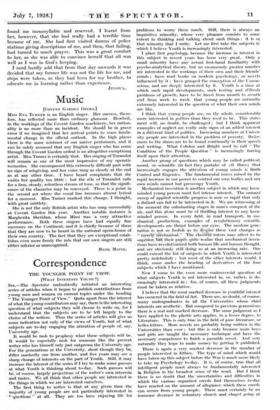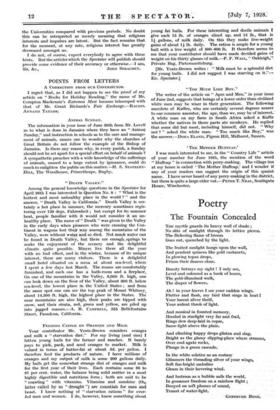Correspondence
THE YOUNGER POINT OF VIEW.
[VVIIAT INTERESTS YOUTH ?1 Sta,—The Spectator undoubtedly initiated an interesting series of articles when it began to publish contributions from young men and women on current topics under the heading " The Younger Point of View." Quite apart from the interest of what the young contributors may say, there is the interesting question of what subjects they will choose to write on, for I understand that the subjects are to be left largely to the choice of the writers. Thus the series of articles will give us some indication not only of the views of Youth, but of what subjects are to-day engaging the attention of people of, say, University age.
It would be rash to prophesy what these subjects will be. It would be especially rash for someone like the present writer who has himself only just outgrown the University age. For the generations at the University, short though they be, differ markedly one from another, and five years may see a sharp change of interests on the part of Youth. Still, it may increase the interest of the series if I try to make some guesses at what Youth is thinking about to-day. Such guesses will be, of course, largely projections of the writer's own interests and tastes. We all think that other people are interested in the things in which we are interested ourselves.
The first thing to notice is that at any given time the majority of "young people are not particularly interested in - questions " at all. They are too busy enjoying life for
problems to worry them much. Still, there is always an inquisitive minority, whose very pleasure consists to some extent in thinking and talking about such things : it is of that minority that I write. Let me first take the subjects in which I believe Youth is increasingly interested.
I place first psychology, because the increase in interest in this subject in recent years has been very great. Only a small minority have any actual first-hand familiarity with psycho-analytical theory, but an enormously greater -number are interested in the workings of their own and their friends' minds ; have read books on modern psychology, or novels influenced by it ; have grasped the conception of the Uncon- scious, and are deeply interested by it. Youth is a time at which such rapid developments, such testing and difficult problems of growth, have to be faced from month to month and from week to week, that young people arc naturally extremely interested in the question of what their own minds are like.
I think that young people are, on the whole, considerably more interested in politics than they used to be. This state- ment will, no doubt, be challenged ; but I think apparent examples of neglect are really only signs of an added interest in a different kind of politics. Increasing numbers of Univer- sity people are interested in the problem of poverty. Refer- ences to the slums are to be found continually in their speech and writing. What Cobden and Bright used to call " The Condition of the People Question is increasingly forcing itself upon their attention.
Another group of questions which may be called political, moral, or scientific (in fact they partake of all three) that increasingly engages the attention of young minds is Birth Control and Eugenics. The fundamental issues raised by the rapid increase in our power to control our own bodies and our own minds cannot but preoccupy Youth.
Mechanical invention is another subject in which any keen- minded young person must feel intense interest. The onward sweep of applied scientific progress is now so rapid that only a dullard can fail to be interested in it We are witnessing at the moment the culminating stages in man's conquest of the air, and this alone must be of thrilling interest to any keen- minded person. In every field, in road transport, in me- chanical production, examples of revolutionary scientific developments are thrust before our The modern gene- ration is .not so foolish as to espse these vast changes as " inere134irechanical." The CliialtAl tutors may affect to be superior,Afigt their pupils quite realizethat mechanical inven- tions have revolutionized both human life and human thought, and are obviously still doing so at an increasing rate. One could extend the list of subjects in which Youth is interested pretty indefinitely ; but most of the other interests would, 1 think, come under the heading of derivatives of the four subjects which I have mentioned.
Now I come to the even more controversial question of what subjects Youth is not interested in, or, rather, is de- creasingly interested in ; for, of course, all these judgments must be taken as relative.
I believe that the most marked decrease in youthful interest has occurred in the field of Art. There are, no doubt, of course, many undergraduates in all the Universities whose chief interests are aesthetic. But compared to previous generations there is a real and marked decrease. The same judgment as I have applied to the plastic arts applies, in a lesser degree, to Literature. This is only true in the field of pure literature, or belles-lettres. More novels arc probably being written in the Universities than ever ; but this is only because more boys and girls are taught the necessary technique and have the necessary competence to finish a passable novel. And very naturally they hope to make money by getting it published.
There is again a very marked decrease in the number of people interested in Ethics. The type of mind which would have taken up this subject before the War is much more likely to take up Psychology to-day. It is, of course, true that all intelligent people must always be fundamentally interested it Religion in the broadest sense of the word. But I think there is no doubt that the uncertainties and difficulties in which the various organized creeds find themselves to-day have reacted on the amount of allegiance which these creeds can secure from young people. There must certainly be an - immense decrease in voluntary church and chapel going at the Universities compared with previous periods._ doubt this can be interpreted as merely meaning that religious interests and impulses are latent. But the fact remains that for the moment, at any rate, religious interest has greatly decreased amongst us.
I do not, of course, expect everybody to agree with these hints. But the articles which the Spectator will publish should provide some evidence of their accuracy or otherwise.—I am,













































 Previous page
Previous page